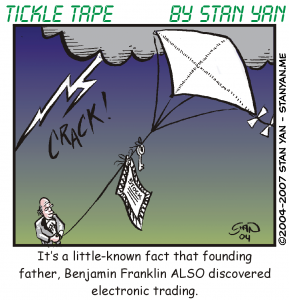Novice traders describe a common ailment: “I don’t know what it is, but I can’t stick with my trading plan. I try to stay calm, but when I see the price fall, I panic. I close my position before it’s too late.” There may be many reasons for the inability of a novice to stick with a trading plan, but one issue is coping with emotions. In some cases, it may just be a matter of fruitlessly trying to control a reflex.
Emotions are often knee-jerk reactions. When we perceive that harm is imminent, we naturally react with fear and take immediate action. It’s a conditioned reflex, like Pavlov’s dogs. When a dog sees a steak, its mouth waters in anticipation. If you ring a bell every time you show the dog a steak, it starts to salivate even when you ring the bell and leave the steak in the freezer. It’s much the same way with trading. When you see the stock price drop, you naturally assume that you need to get out of harm’s way.
Humans are more complex than lower animals, though. We think. When we react emotionally, we aren’t reacting to events specifically, but our interpretation of events. The sell-off we perceive is not threatening, but our interpretation makes it feel like it is. We think, “There’s a sell-off. Therefore, I’m going to lose on this position, and so, I better sell right now.” In our thoughts, we might rationally understand that it might be a better idea to wait a little while to see if the perceived sell-off is a temporary blip or a longer-term trend, but our emotions take over. We may react immediately, and spontaneously, with fear. Fear is a conditioned reflex. It happens fast and takes over before we can do much about it.
Conditioned emotional reflexes are powerful. Some people, for example, have major problems with conditioned emotional reactions, such as people who are afraid to go over a bridge out of fear. A less intense fear reaction happens when novice traders panic, but the same kind of psychological processes occur, and similar kinds of methods to control these emotions can be used.
When controlling a fear reaction, it’s important to acknowledge the psychological power of the emotional reaction. When it happens, it can be intense and hard to control. If you have trouble dealing with an emotion, like fear, don’t underestimate its power. There’s a biological element that may be hard to control. One way to control the biological element is to use a technique called “counter-conditioning.”
Here’s how it works. It’s impossible for the body to feel two opposing biological tendencies. For example, you can’t feel both afraid and relaxed. One feeling cancels out the other. When you are intensely afraid, it may not work to merely think, “Calm down, relax.” The biological arousal may be too strong. You may have to step back and do deep breathing exercises, or even try some physical exercise in order to create a strong relaxation response to counteract a reflexive fear response.
Again, don’t underestimate the power of a fear response. It may be hard to control at first, and you may have to patiently accept the fact that it will take some time and practice to gain mastery over it. It doesn’t help matters, though, if you have something to be truly afraid of. If you’re risking money that you can’t afford to lose, or if you are not carefully controlling risk, then you have good reason to feel fear. It’s hard to fight biology and reality. Make sure that you take whatever precautions are necessary to reduce fear. Manage risk and only trade with money that you can afford to lose.
There are times when fear is a powerful, debilitating emotion. It can consume you to the point that you abandon a solid trading plan prematurely. It’s both a biological and psychological response that you may need to work on overcoming. The more you can learn to control your emotions, the more likely you will trade in the calm, deliberate mindset of a winning trader.


